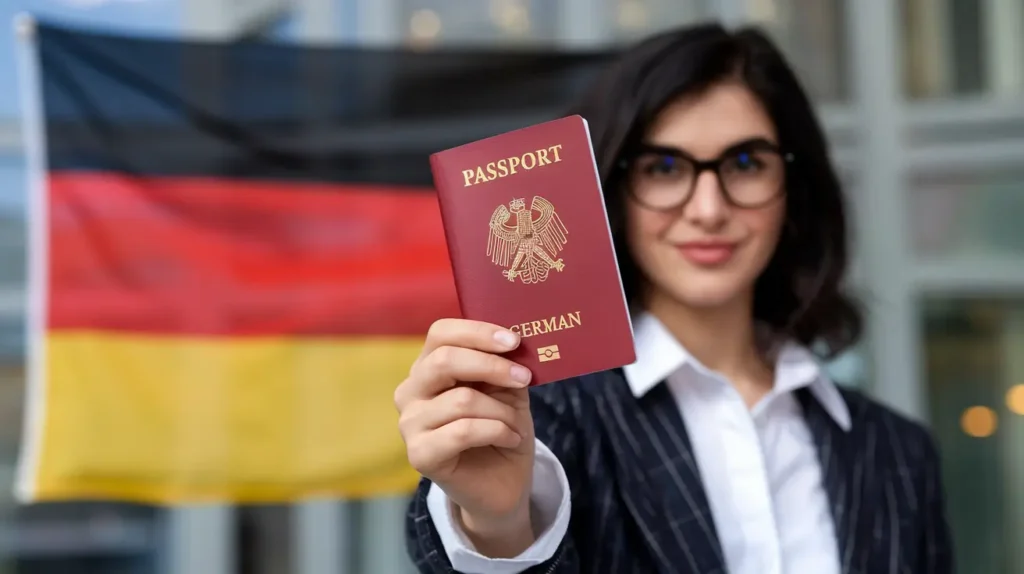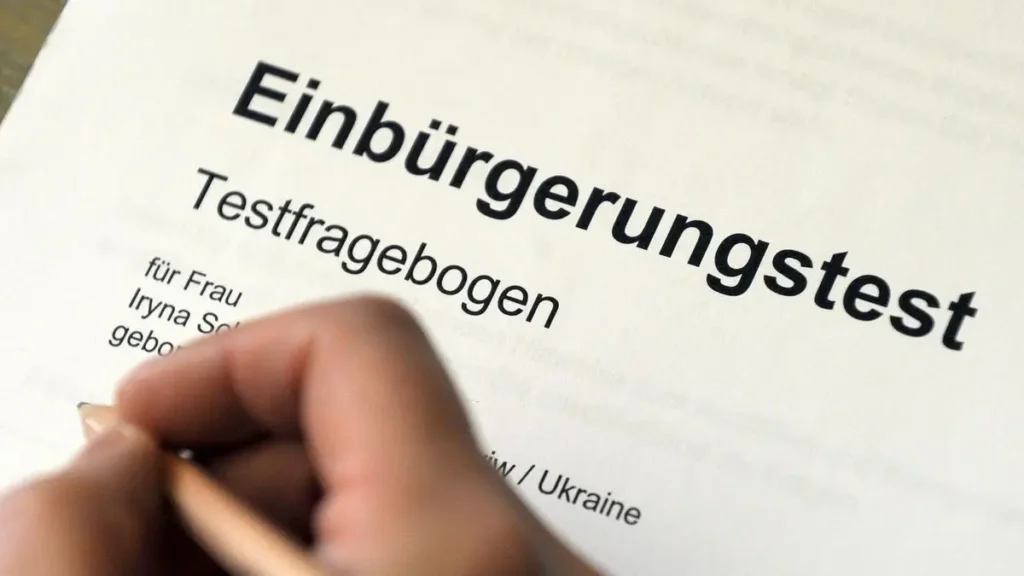Do you belong to the skilled workers in Germany, and wondering about the German Naturalization? This comprehensive guide shows you the necessary steps of obtaining German citizenship as a skilled worker under the new legislation. We’ll explore the eligibility requirements, application process, benefits, and challenges you might face on your journey to becoming a German citizen. Whether you’re a tech professional in Berlin, an engineer in Munich, or a researcher in Hamburg, this article will provide you with valuable insights to help you navigate your path to German citizenship.
- 1. Overview of the New German Citizenship Law
- 2. Eligibility Requirements for Skilled Workers
- 3. The Application Process
- 4. Dual Citizenship is now allowed in Germany
- 5. Benefits of German Citizenship for Skilled Workers
- 6. Challenges for German Skilled Laborers
- 7. Comparison with Other EU Countries
- 8. Frequently Asked Questions
1. Overview of the New German Citizenship Law
In 2024, the German government introduced sweeping changes to its citizenship laws, aiming to modernize the naturalization process and make it more accessible to skilled workers who contribute to the country’s economy and society. This new legislation marks a significant shift in Germany’s approach to immigration and integration.
Key changes in the new German Citizenship Law include:
- Reduced residency requirements: The standard residency period required for citizenship has been shortened, with special provisions for skilled workers.
- Dual citizenship acceptance: The new law allows for dual citizenship, eliminating the need for individuals to renounce their original nationality in most cases.
- Streamlined process for skilled workers: Recognizing the value of skilled professionals, the law introduces specific pathways and considerations for this group.
- Enhanced integration focus: While easing some requirements, the law maintains a strong emphasis on integration, including language proficiency and civic knowledge.
- Special provisions for certain groups: The law includes specific considerations for descendants of Nazi persecution victims and certain long-term residents.
These changes reflect Germany’s commitment to attracting and retaining global talent while ensuring successful integration into German society. For skilled workers, this new law opens up unprecedented opportunities to build a long-term future in Germany.
2. Eligibility Requirements for Skilled Workers
To be eligible for German citizenship as a skilled worker under the new law, you must meet several key requirements. Let’s break these down into four main categories:
2.1 Residency Period
One of the most significant changes in the new law is the reduction of the required residency period for citizenship applications. For skilled workers, the requirements are as follows:
- Standard path: Skilled workers can apply for citizenship after 3 years of legal residency in Germany, provided they meet other criteria such as language proficiency and integration.
- Fast-track option: In cases of exceptional integration, particularly strong language skills, or outstanding professional achievements, skilled workers may be eligible to apply after just 2 years of residency.
It’s important to note that these periods are significantly shorter than the previous requirement of 8 years for standard naturalization.
2.2 Language Proficiency
Demonstrating German language skills remains a crucial requirement for citizenship. Under the new law, the language requirements for skilled workers are:
- Standard requirement: Proficiency at the B1 level of the Common European Framework of Reference for Languages (CEFR).
- Fast-track option: For those seeking accelerated naturalization, B2 level proficiency or higher is typically required.
Applicants must provide official language certificates from recognized institutions to prove their proficiency. The ability to communicate effectively in German is seen as essential for successful integration into the workforce and society at large.
2.3 Financial Stability
To be eligible for citizenship, skilled workers must demonstrate their ability to support themselves and their dependents without relying on social welfare. This typically involves:
- Stable employment in a skilled profession
- Regular income that meets or exceeds the minimum wage requirements
- Adequate pension provisions or plans for retirement security
The exact financial thresholds may vary depending on factors such as family size and location within Germany. It’s advisable to consult with local authorities or immigration experts for specific requirements in your situation.
2.4 Integration and Civic Knowledge
The new law maintains a strong focus on integration into German society. Skilled workers applying for citizenship must:
- Pass the “Leben in Deutschland” (Life in Germany) test, which assesses knowledge of German legal and social systems, history, and culture.
- Demonstrate commitment to the principles of the German constitution (Grundgesetz).
- Show active participation in community life, which can include involvement in local associations, volunteer work, or other civic engagements.
Additionally, applicants must have a clean criminal record and declare their commitment to democratic values and the rule of law in Germany.
Meeting these eligibility requirements is the first step towards German citizenship. In the next section, we’ll explore the application process in detail, helping you understand what to expect as you embark on this important journey.
3. The Application Process
Navigating the application process for German citizenship can seem daunting, but with proper preparation and understanding, it can be a smooth journey. Let’s break down the process into manageable steps:
3.1 Required Documents
To apply for German citizenship as a skilled worker, you’ll need to gather and submit the following documents:
- Completed application form: This can be obtained from your local citizenship office (Staatsangehörigkeitsbehörde).
- Valid passport or ID: A certified copy of your current passport or national ID card.
- Birth certificate: An official, translated, and apostilled copy of your birth certificate.
- Residence permit: Proof of your legal residency in Germany, such as your current residence permit.
- Employment contract and salary statements: To demonstrate your status as a skilled worker and financial stability.
- Language certificate: Official proof of your German language proficiency (B1 or B2 level, depending on your path).
- Integration course certificate: If you’ve completed an integration course in Germany.
- “Leben in Deutschland” test certificate: Proof that you’ve passed the civic knowledge test.
- Criminal record check: Both from Germany and your country of origin.
- Proof of address: Such as a recent utility bill or rental agreement.
- Photographs: Biometric passport photos meeting German standards.
- Renunciation certificate: If required, proof that you’ve renounced your previous citizenship (note that under the new law, this is often not necessary).
Ensure all non-German documents are officially translated and authenticated. It’s advisable to start collecting these documents well in advance of your application.
3.2 Submission and Processing
Once you have gathered all necessary documents, follow these steps:
- Schedule an appointment: Contact your local citizenship office to schedule an application submission appointment.
- Submit your application: Attend your appointment, submit all required documents, and pay the application fee. As of 2024, the fee for citizenship application is €255, but be sure to check for any updates.
- Interview: You may be required to attend an interview to assess your integration and commitment to German values.
- Processing time: The processing time can vary significantly depending on your location and individual circumstances. On average, it takes between 6 to 24 months.
- Oath of allegiance: If your application is approved, you’ll be invited to take an oath of allegiance to the German constitution.
- Receive your certificate: Upon taking the oath, you’ll receive your certificate of naturalization, officially making you a German citizen.
Throughout the process, maintain open communication with the citizenship office. They may request additional documents or information, and prompt responses can help expedite your application.
Remember, while the new law has streamlined many aspects of the process for skilled workers, patience and thorough preparation remain key to a successful citizenship application.
4. Dual Citizenship is now allowed in Germany
One of the most significant changes in the new German Citizenship Law is the broader acceptance of dual citizenship. This shift opens up new possibilities for skilled workers who wish to maintain ties with their country of origin while fully integrating into German society.
Key Points About Dual Citizenship:
- General acceptance: Under the new law, most applicants are allowed to retain their original citizenship when acquiring German nationality.
- No renunciation requirement: In most cases, you won’t be required to renounce your original citizenship to become a German citizen.
- Equality of citizenships: Both citizenships are considered equal under German law. You’ll be treated as a German citizen within Germany and the EU.
- Voting rights: Dual citizens can typically vote in elections in both countries, subject to the laws of each nation.
- Passport usage: You can use either passport for travel, but must use your German passport when entering or leaving Germany.
- Military service: If your country of origin requires military service, this could potentially conflict with German law. It’s important to check the specific regulations.
- Tax implications: Dual citizenship may have tax implications, particularly if you have financial interests in both countries. Consulting with a tax professional is advisable.
- Country-specific considerations: While Germany now broadly accepts dual citizenship, your country of origin may have different rules. Always check the citizenship laws of your home country.
The acceptance of dual citizenship represents a major shift in Germany’s approach to naturalization. It acknowledges the reality of our globalized world, where individuals often have deep connections to multiple countries. For skilled workers, this change eliminates one of the major barriers that previously prevented many from pursuing German citizenship.
However, it’s important to thoroughly consider the implications of dual citizenship for your personal and professional life. While it offers many advantages, it also comes with responsibilities to both nations.
In the next section, we’ll explore the various benefits that German citizenship offers to skilled workers, helping you understand why this step might be valuable for your future in Germany.
5. Benefits of German Citizenship for Skilled Workers

Obtaining German citizenship offers numerous advantages for skilled workers, extending far beyond the right to live and work in Germany indefinitely. Let’s explore the key benefits:
- EU Freedom of Movement: As a German citizen, you gain the right to live and work in any EU country without additional visas or permits.
- Political Participation: You can vote in all German elections and run for political office, giving you a voice in shaping the country’s future.
- Enhanced Job Opportunities: Some positions, particularly in the public sector and sensitive industries, are reserved for EU/German citizens.
- Stronger Job Security: German citizenship provides additional protection against job loss due to changes in immigration policies.
- Ease of Travel: A German passport offers visa-free or visa-on-arrival access to numerous countries worldwide.
- Access to EU Education: You and your family members can study in any EU country under the same conditions as nationals.
- Social Security Benefits: Full access to Germany’s comprehensive social security system, including healthcare and pension benefits.
- Consular Protection: You’re entitled to consular protection from any EU embassy worldwide when traveling outside the EU.
- Family Reunification: Simplified process for bringing family members to Germany.
- Cultural Integration: Citizenship can foster a deeper sense of belonging and integration into German society.
- Business Opportunities: Easier access to business loans, grants, and certain business licenses.
- Property Rights: While non-EU citizens can buy property in Germany, citizenship removes any potential restrictions.
For Skilled Workers in Germany, these benefits can significantly enhance both personal and professional opportunities. German citizenship not only secures your future in Germany but also opens doors across the European Union and beyond.
6. Challenges for German Skilled Laborers
While the path to German citizenship for skilled workers has been simplified, it’s important to be aware of potential challenges and considerations:
- Language Barrier: Achieving B1 or B2 German proficiency can be challenging, especially while balancing a demanding career.
- Cultural Adaptation: Fully integrating into German society and understanding cultural nuances takes time and effort.
- Bureaucratic Process: Despite improvements, the application process can still be complex and time-consuming.
- Potential Loss of Original Citizenship: While dual citizenship is now widely accepted, some countries may still require you to give up your original nationality.
- Tax Implications: Dual citizenship may complicate your tax situation, especially if you have financial interests in multiple countries.
- Military Service Obligations: If your country of origin requires military service, this could potentially conflict with German law.
- Career Impact: Some positions in your home country may become inaccessible if they require single citizenship.
- Emotional Considerations: The decision to take on a new citizenship can be emotionally complex, potentially affecting your sense of identity.
- Family Considerations: Your decision may impact family members, especially if they’re not eligible for or interested in German citizenship.
- Long-term Commitment: Citizenship represents a significant commitment to Germany. Consider your long-term plans carefully.
Being aware of these challenges allows you to make an informed decision and prepare adequately for the naturalization process. Despite these considerations, many Skilled Workers in Germany find that the benefits of German citizenship far outweigh the challenges.
7. Comparison with Other EU Countries
To provide context for Germany’s new citizenship law, it’s helpful to compare it with the policies of other major EU countries:
- France:
- Residency requirement: 5 years (2 years for graduates of French universities)
- Language requirement: B1 level
- Allows dual citizenship
- Netherlands:
- Residency requirement: 5 years
- Language requirement: A2 level
- Generally does not allow dual citizenship, with some exceptions
- Spain:
- Residency requirement: 10 years (2 years for citizens of certain countries)
- Language requirement: A2 level
- Allows dual citizenship only for certain nationalities
- Italy:
- Residency requirement: 10 years (4 years for EU citizens)
- Language requirement: B1 level
- Allows dual citizenship
- Sweden:
- Residency requirement: 5 years
- No formal language requirement
- Allows dual citizenship
Compared to these countries, Germany’s new law offers:
- Shorter residency requirements for skilled workers (3 years, or 2 years in special cases)
- A moderate language requirement (B1, or B2 for fast-track)
- Acceptance of dual citizenship for most applicants
This comparison highlights how Germany’s new citizenship law positions the country as one of the more attractive options for skilled workers in the EU, combining relatively short residency requirements with the acceptance of dual citizenship.
8. Frequently Asked Questions
To address common concerns, here are some frequently asked questions about citizenship for Skilled Workers in Germany:
- Q: Can I apply for citizenship if I’m on a work visa?
A: Yes, as long as you meet the residency and other requirements. - Q: Do I need to give up my current citizenship?
A: Under the new law, most applicants can retain their original citizenship. - Q: What if I don’t pass the language test?
A: You can retake the test. Consider additional language courses if needed. - Q: How long does the application process take?
A: It typically takes 6 to 24 months, depending on individual circumstances. - Q: Can my family members also get citizenship?
A: They may be eligible if they meet the requirements. Children born to a German citizen parent automatically receive German citizenship. - Q: What if I’ve lived in Germany for less than 3 years?
A: You may be eligible for the fast-track option if you demonstrate exceptional integration.




